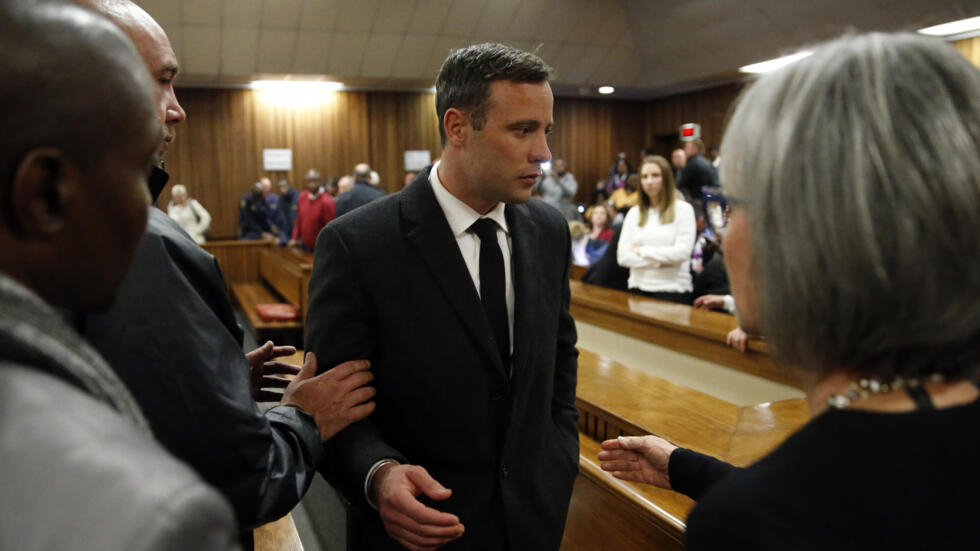The world has been captivated by the news of Oscar Pistorius parole release, the celebrated South African Paralympic champion, being granted parole after serving nearly 11 years for the tragic death of his girlfriend, Reeva Steenkamp.
This significant development in the high-profile case has rekindled discussions about justice, rehabilitation, and the aftermath of a deeply unsettling event. Pistorius’ parole release marks a crucial moment not just in the legal sphere but also in the collective consciousness regarding crimes of passion and the notion of redemption after a grievous act.
Oscar Pistorius Parole Release: A Controversial Decision
The parole release of Oscar Pistorius after serving 11 years for the murder of Reeva Steenkamp has sparked polarizing debates globally. The decision to grant parole in a case that gained international attention for its gravity and complex legal proceedings has invited scrutiny from various quarters.
Critics question whether the sentence served adequately addresses the severity of the crime and whether Pistorius’ release aligns with the principles of justice and deterrence.
Throughout the Reeva Steenkamp murder case parole, legal complexities have been prevalent. The parole granted in Pistorius’ case reflects a delicate balance between the need for rehabilitation and societal expectations of accountability. It raises pertinent questions about the efficacy of the justice system in handling cases involving high-profile individuals and the nuances of sentencing in such circumstances.
Pistorius Freedom After 11 Years: Impact and Reflection
The news of Pistorius’ freedom after 11 years prompts reflections on the aftermath of the Reeva Steenkamp tragedy. Beyond legal discussions, this significant event compels society to contemplate issues surrounding domestic violence, rehabilitation, and the legacies left by such distressing incidents. The Reeva Steenkamp tragedy aftermath underscores the importance of ongoing conversations about intimate partner violence and the need for support systems for victims and survivors.

Oscar Pistorius Legal Release: Global Perspectives
The parole granted to Oscar Pistorius in his high-profile case reverberates across borders, inviting varied reactions and perspectives globally. Public opinion regarding his release on parole remains divided, reflecting diverse cultural, ethical, and moral considerations.
This case has also amplified discussions about the role of media, celebrity status, and its impact on legal proceedings and public perception of justice.
Pistorius Rehabilitation and Parole
This high-profile case marks a significant moment in the intersection of justice, accountability, and societal perceptions of rehabilitation. Pistorius’ journey through rehabilitation and eventual parole serves as a testament to the complexities within the criminal justice system, prompting discussions on the efficacy of rehabilitation programs and the challenges in reintegrating individuals like Pistorius back into society.
The scrutiny surrounding Pistorius’ rehabilitation and parole underscores the critical need for more nuanced approaches to offender rehabilitation, emphasizing the importance of comprehensive reformation efforts that address not just punitive measures but genuine pathways to societal reintegration and rehabilitation post-incarceration.
Public Reaction to Pistorius’ Parole
The announcement of Oscar Pistorius’ parole release after an 11-year incarceration following the tragic death of Reeva Steenkamp has sparked significant public reaction and discourse worldwide. The news of his impending release on parole has brought forth a spectrum of emotions, opinions, and debates across different corners of the globe. This development has reignited discussions on justice, accountability, and the complexities of parole decisions in high-profile cases. Understanding the varied public reactions to Pistorius’ parole is pivotal in grasping the multifaceted nature of societal perceptions toward rehabilitation, forgiveness, and the implications of his reintroduction into the community.
Conclusion
In conclusion, the parole release of Oscar Pistorius following 11 years for Reeva Steenkamp’s death symbolizes a nuanced interplay of legal, moral, and societal considerations. The discussion surrounding this case extends beyond a single individual’s release; it invites introspection into our collective stance on justice, redemption, and the complexities inherent in cases of intimate partner violence.
As the world grapples with this development, it underscores the necessity of ongoing dialogue and action to prevent such tragedies and support the affected individuals and communities worldwide.
